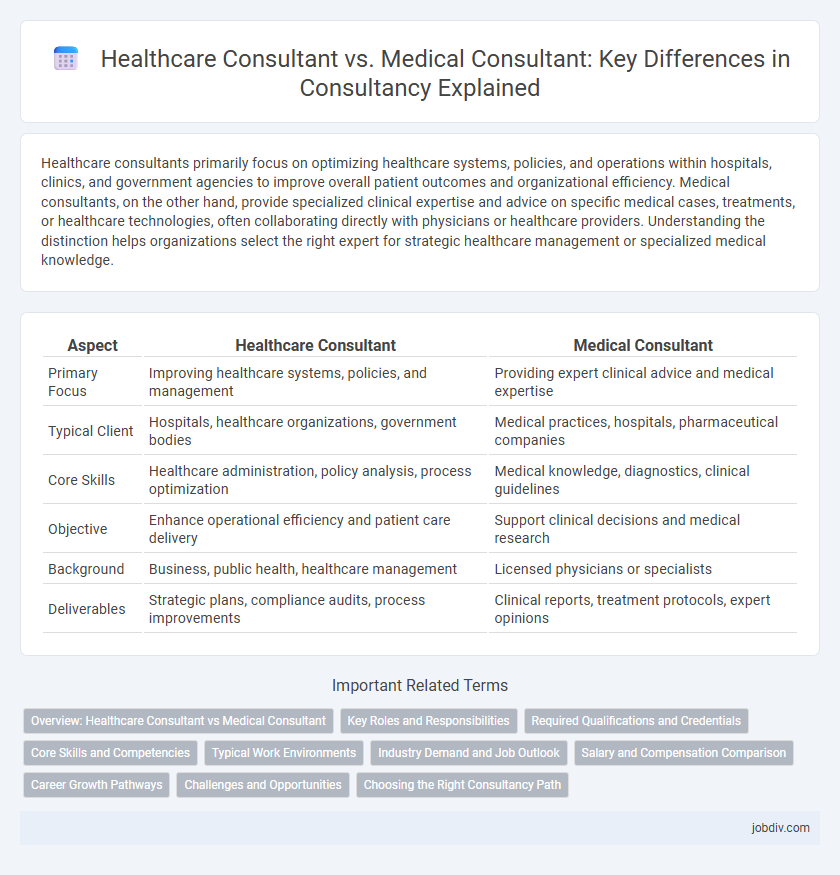Healthcare consultants primarily focus on optimizing healthcare systems, policies, and operations within hospitals, clinics, and government agencies to improve overall patient outcomes and organizational efficiency. Medical consultants, on the other hand, provide specialized clinical expertise and advice on specific medical cases, treatments, or healthcare technologies, often collaborating directly with physicians or healthcare providers. Understanding the distinction helps organizations select the right expert for strategic healthcare management or specialized medical knowledge.
Table of Comparison
| Aspect | Healthcare Consultant | Medical Consultant |
|---|---|---|
| Primary Focus | Improving healthcare systems, policies, and management | Providing expert clinical advice and medical expertise |
| Typical Client | Hospitals, healthcare organizations, government bodies | Medical practices, hospitals, pharmaceutical companies |
| Core Skills | Healthcare administration, policy analysis, process optimization | Medical knowledge, diagnostics, clinical guidelines |
| Objective | Enhance operational efficiency and patient care delivery | Support clinical decisions and medical research |
| Background | Business, public health, healthcare management | Licensed physicians or specialists |
| Deliverables | Strategic plans, compliance audits, process improvements | Clinical reports, treatment protocols, expert opinions |
Overview: Healthcare Consultant vs Medical Consultant
Healthcare consultants specialize in improving healthcare systems, focusing on operational efficiency, regulatory compliance, and strategic planning for hospitals, clinics, and insurance providers. Medical consultants, often licensed physicians, provide expert medical advice on clinical cases, pharmaceutical development, or medical-legal issues. Both roles require domain expertise, but healthcare consultants prioritize administrative improvements while medical consultants focus on direct medical knowledge and patient care insights.
Key Roles and Responsibilities
Healthcare consultants analyze healthcare systems to improve efficiency, reduce costs, and ensure compliance with regulations, focusing on hospital administration, patient care models, and healthcare policy implementation. Medical consultants provide expert advice on clinical practices, medical device usage, and treatment protocols, often collaborating directly with physicians and healthcare providers to enhance patient outcomes. Both roles require deep industry knowledge, but healthcare consultants typically address operational and strategic challenges, while medical consultants specialize in clinical expertise and medical insights.
Required Qualifications and Credentials
Healthcare consultants typically require a background in healthcare administration, public health, or business, often holding degrees such as an MPH, MHA, or MBA, coupled with experience in healthcare systems and policy analysis. Medical consultants must be licensed physicians or hold advanced clinical degrees, with board certification in their specialty, demonstrating expertise in patient care, medical standards, and clinical problem-solving. Both roles demand strong analytical skills and knowledge of healthcare regulations, but medical consultants focus more on clinical accuracy, while healthcare consultants emphasize operational efficiency and strategic planning.
Core Skills and Competencies
Healthcare consultants specialize in system-wide improvements, data analytics, regulatory compliance, and strategic planning, leveraging competencies in healthcare policy and operational efficiency. Medical consultants focus on clinical expertise, patient care optimization, and medical diagnostics, requiring in-depth knowledge of medical science and patient management. Both roles demand strong communication skills, but healthcare consultants emphasize business acumen while medical consultants prioritize clinical proficiency.
Typical Work Environments
Healthcare consultants typically operate within hospitals, healthcare systems, insurance companies, and public health organizations, focusing on improving operational efficiency, regulatory compliance, and patient care strategies. Medical consultants often work directly with pharmaceutical companies, medical device manufacturers, and clinical research organizations to provide expert clinical insights and support medical product development. Both roles may involve frequent collaboration with multidisciplinary teams but differ significantly in their primary work settings and focus areas.
Industry Demand and Job Outlook
Healthcare consultants experience growing demand driven by healthcare system reforms and the need for operational efficiency, with job growth projected at 14% through 2030 according to the U.S. Bureau of Labor Statistics. Medical consultants, often physicians providing clinical expertise to pharmaceutical companies and healthcare organizations, face steady demand tied to medical technology advances and research development. Both roles benefit from expanding healthcare investments, but healthcare consultants typically have broader industry opportunities compared to the specialized niche of medical consultants.
Salary and Compensation Comparison
Healthcare Consultants typically earn between $70,000 and $120,000 annually, focusing on improving healthcare systems, policy implementation, and operational efficiency for hospitals and clinics. Medical Consultants, often physicians with specialized knowledge, command higher salaries ranging from $150,000 to $300,000, reflecting their direct involvement in clinical decision-making and medical expertise. Compensation packages for Medical Consultants often include performance bonuses and consultancy fees, while Healthcare Consultants might receive standard salaries with potential for project-based incentives.
Career Growth Pathways
Healthcare consultants typically focus on improving healthcare systems, policies, and administrative processes, offering broad career growth into healthcare management, policy advisory, and operational leadership roles. Medical consultants are usually specialized physicians or practitioners providing expert clinical advice, with career progression often leading to expert clinical advisory positions, medical research, or pharmaceutical consulting. Both career pathways demand continuous education and professional development but diverge in focus--healthcare consultants emphasize systemic efficiency while medical consultants prioritize clinical expertise.
Challenges and Opportunities
Healthcare consultants navigate complex regulatory frameworks and evolving patient care technologies, offering opportunities to improve system efficiencies and healthcare outcomes. Medical consultants face challenges in providing specialized clinical expertise while adapting to diverse healthcare settings, driving innovations in treatment protocols and patient management. Both roles demand continuous learning and strategic collaboration to address healthcare disparities and optimize service delivery.
Choosing the Right Consultancy Path
Healthcare consultants specialize in improving systems, operations, and policies across healthcare organizations, focusing on efficiency, compliance, and patient care strategies. Medical consultants, often physicians, provide expert clinical advice, support medical device development, or assist in clinical trials with in-depth medical knowledge. Choosing the right consultancy path depends on whether you aim to influence healthcare management and policy or contribute clinical expertise to healthcare innovations and patient care improvements.
Healthcare Consultant vs Medical Consultant Infographic

 jobdiv.com
jobdiv.com